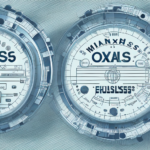Introduction to CAS RW-L Series and Fairbanks Scales
In the competitive world of weighing solutions, CAS RW-L Series and Fairbanks Scales stand out as two of the most reputable brands. With decades of experience, both companies offer unique features tailored to diverse business needs across various industries. This comprehensive analysis explores their offerings in terms of features, accuracy, load capacity, pricing, durability, ease-of-use, customer reviews, and ratings, equipping you with the knowledge to determine which scale best aligns with your business requirements.
Company Background
CAS RW-L Series
CAS RW-L Series, produced by CAS Corporation, a South Korean company, has been delivering cutting-edge weighing solutions for over 30 years. Since its inception in 1983, CAS Corporation has expanded to become one of the world's largest scale manufacturers, with a presence in over 120 countries (source).
The RW-L Series encompasses a range of industrial weighing scales designed for sectors including manufacturing, logistics, and agriculture. Known for their accuracy, durability, and user-friendliness, these scales help businesses optimize operations and enhance efficiency.
Fairbanks Scales
Founded in 1887, Fairbanks Scales has been a pioneer in the weighing industry for well over a century. The company has contributed to significant historical projects, including the construction of the Golden Gate Bridge, the Hoover Dam, and the Panama Canal.
In 1897, Fairbanks introduced the first platform scale, a groundbreaking innovation that revolutionized the weighing industry. This led to the development of the first automatic weighing system in 1950, setting new standards for scale technology. Today, Fairbanks Scales operates in over 80 countries (source), maintaining its position as a global leader with advancements like wireless connectivity and cloud-based data management.
Key Features and Functionalities
CAS RW-L Series Features
- Automatic Zero Tracking: Ensures accurate measurements by compensating for minor weight changes.
- Counting and Accumulation: Facilitates batch processing and inventory management.
- Comparator Functions: Allows comparison of current measurements against predefined standards.
- Durable Stainless-Steel Weighing Pan: Resists corrosion and extends the scale's lifespan.
- Bright LED Display: Enhances readability in various lighting conditions.
- Rechargeable Battery: Offers up to 40 hours of continuous use, supporting mobile operations.
The RW-L Series comprises four models—RW-10L, RW-30L, RW-60L, and RW-150L—supporting weight capacities from 10kg to 150kg, catering to a wide range of industrial applications. Additional functionalities include a user-friendly interface for easy calibration and customization, with the ability to display weight in various units (grams, kilograms, pounds, ounces). The built-in RS-232 interface enables seamless data transfer to computers or printers, essential for inventory management and quality control.
Fairbanks Scales Features
- FB2250 Series
- Built-in traffic light system indicating load/unload readiness.
- Diamond treadplate deck for enhanced traction and safety.
- EZ-Weigh Universal Indicator
- Supports remote operation.
- Easy integration with other systems.
- Talon HVX Series
- Rugged steel platform designed for heavy-duty applications.
- High-capacity load cell system handling up to 30,000 pounds.
- User-friendly interface for straightforward calibration and operation.
- Ultegra Series
- Portable and lightweight, ideal for on-the-go use.
- Rechargeable battery offering up to 100 hours of continuous use.
- Large LCD display for visibility in any lighting.
These features underscore Fairbanks Scales’ commitment to providing reliable, versatile scales suitable for various industrial environments.
Comparative Analysis
Accuracy Levels
Both CAS RW-L Series and Fairbanks Scales are renowned for their precision. The CAS RW-L Series boasts a resolution of 1/3000, while Fairbanks Scales offer a higher resolution of 1/25000. Although both provide accurate measurements, Fairbanks Scales deliver superior precision due to their finer resolution.
However, for most general and industrial applications, the accuracy levels of both scales are more than sufficient. External factors such as temperature, humidity, and vibrations can affect measurement accuracy, making regular calibration essential. Industries demanding extreme precision, like pharmaceuticals or jewelry, may prefer scales with the highest resolutions.
Load Capacity
Load capacity is a critical consideration for businesses when selecting a weighing solution. The CAS RW-L Series includes models with capacities ranging from 10kg to 150kg, suitable for small to medium-scale operations.
In contrast, Fairbanks Scales provide a broader range of load capacities, from 15kg up to 500,000kg, making them ideal for heavy-duty industrial applications. This extensive range ensures that Fairbanks can cater to diverse industries, from manufacturing and transportation to mining and construction.
Businesses requiring high-capacity scales may find Fairbanks Scales to be more aligned with their needs, while CAS RW-L Series serves well with its sufficient load capacity for many standard applications.
Pricing Structure
Pricing is a vital factor in the decision-making process. Generally, the CAS RW-L Series is positioned as a more affordable option, making it appealing to small and medium-sized businesses.
On the other hand, Fairbanks Scales tend to have a higher initial cost, reflecting their robust construction and higher load capacities. However, their durability and longevity may translate to greater cost-effectiveness over time for heavy industrial use.
Businesses should consider not only the upfront costs but also the long-term value and scalability of the scales to ensure optimal return on investment.
Durability and Longevity
Both CAS RW-L Series and Fairbanks Scales are engineered for durability and longevity. The CAS RW-L Series features a stainless-steel weighing pan, providing resistance to corrosion and wear, ideal for various environmental conditions.
Fairbanks Scales incorporate diamond treadplate decks, enhancing traction and reducing slips, particularly in industrial settings. Their scales are built to withstand harsh environments, including extreme temperatures and heavy usage.
Both brands offer comprehensive warranties, ensuring long-term reliability and customer assurance. The choice between them may hinge on specific durability features tailored to the user’s operational environment.
Ease-of-Use
User experience is vital for efficient operations. The CAS RW-L Series is equipped with a bright LED display and intuitive functions such as automatic zero tracking, counting, accumulation, and comparator capabilities, making it straightforward for operators to use.
Fairbanks Scales, with products like the EZ-Weigh Universal Indicator, offer remote operation features, allowing operators to manage scales from a distance. Their interfaces are designed for easy calibration and navigation, ensuring minimal training and quick adoption.
Both brands emphasize ease-of-use, enabling operators to achieve accurate measurements with minimal effort and time.
Customer Reviews and Ratings
Customer feedback underscores the reliability and performance of both brands. The CAS RW-L Series receives high ratings for its accuracy, durability, and user-friendliness, making it a favored choice among various businesses.
Similarly, Fairbanks Scales are praised for their precision, robustness, and ease-of-use, earning trust in sectors such as transportation, mining, and manufacturing.
Overall, both brands have established strong reputations based on consistent product performance and customer satisfaction.
Choosing the Right Scale for Your Business
Determining the ideal scale between the CAS RW-L Series and Fairbanks Scales depends on your business’s specific requirements:
- If your business requires a high-capacity scale for heavy industrial applications, Fairbanks Scales is the preferable choice.
- For businesses seeking precision and accuracy at a more affordable price, the CAS RW-L Series offers an excellent solution.
- Consider factors such as load capacity needs, desired features, budget constraints, and operational environment to make an informed decision.
Future Outlook for CAS RW-L Series and Fairbanks Scales
As industry leaders, both the CAS RW-L Series and Fairbanks Scales are poised for continued innovation. They are likely to integrate more advanced technologies, such as IoT connectivity and AI-driven analytics, to enhance scale functionality and data management.
Additionally, feedback-driven product development will drive these companies to refine their offerings, ensuring that they meet the evolving needs of businesses across various sectors.
The ongoing commitment to quality and innovation positions both brands to maintain their leadership in the weighing solutions market.
Conclusion: Which Scale is the Better Choice?
Both CAS RW-L Series and Fairbanks Scales deliver reliable and efficient weighing solutions, each with unique strengths tailored to different business needs. When choosing between the two, consider factors such as load capacity, accuracy, durability, pricing, and your specific operational requirements.
Ultimately, whether you prioritize high-capacity industrial scales or precise and cost-effective solutions, both brands offer quality products that can meet and exceed business expectations. Assess your individual needs, budget, and the specific features important to your operations to make an informed decision.






















